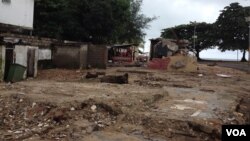Juliana Sesay is among the thousands of sierra Leoneans affected by recently massive government-led demolitions around the capital, Freetown.
The 23-year-old Ebola survivor was living in an area known as Tambakula village, a fisherman’s wharf with shops that some people, like Sesay, also used as homes.
The entire area, population 500, was demolished several weeks ago, and now she’s staying with a friend and sleeping in a room with three other adults, two toddlers and two babies.
This is not how she pictured her life after recovering from the deadly disease that has killed more than 11,000 people across West Africa.
"I’m feeling scared," she said. "After they demolished the place I just say, 'I want to kill myself,' because I don't know where to start.”
Without offers of help or compensation for the destruction of her home, Sesay, like many around the capital, worries about how she will get by.
Since demolishing a wide section of Freetown, the government, which had warned residents about the plans for years, has forced many people into homelessness. While government officials have said residents of the targeted demolition sites were there illegally, human rights groups are concerned. They say the destruction is leaving the most vulnerable at much greater risk in the midst of an Ebola crisis.
Aside from several poor communities, an entire side of the main beach road, where restaurants and bars once stood, was recently razed. Government officials say the area needed to cleaned up and made more appealing to tourists.
“The last three years, there have been meetings where they’ve [the government] told local chiefs around the area that these people don’t belong here," deputy government spokesman Agibu Jalloh said.
According to Solomon Sogbandi, director of Amnesty International in Sierra Leone, the government's good intentions have been poorly executed, doing more harm than good.
“Why not look at an alternative sort of housing for these people?" he said. "Relocate them somewhere. If you just evict them forcefully, it has other human rights implications.”
And health implications. Sogbandi says it’s still rainy season and this can make people more prone to diseases like malaria if they don’t have proper shelter.
Although Jalloh says people were offered land elsewhere a couple of years ago, some residents did go but kept coming back.
Former residents say they have not been offered any help.




